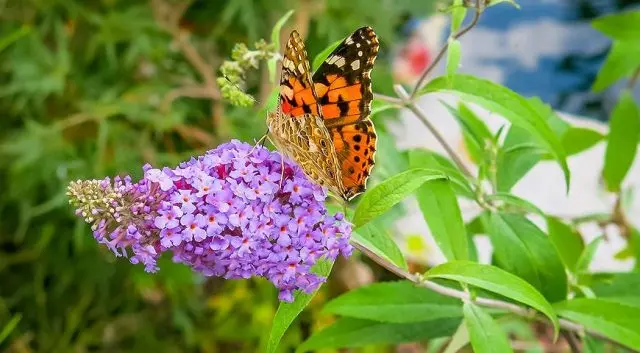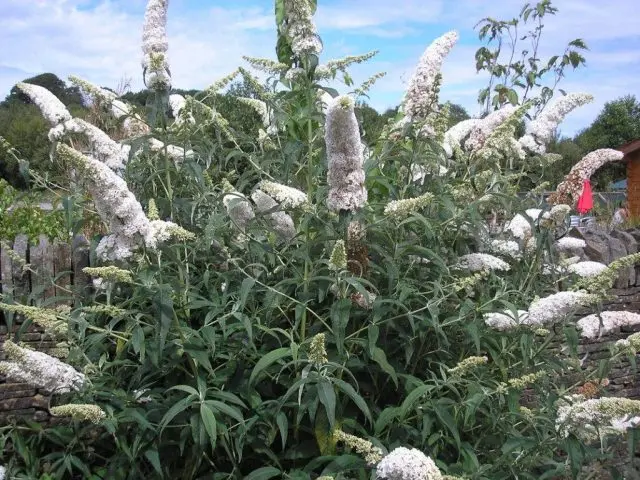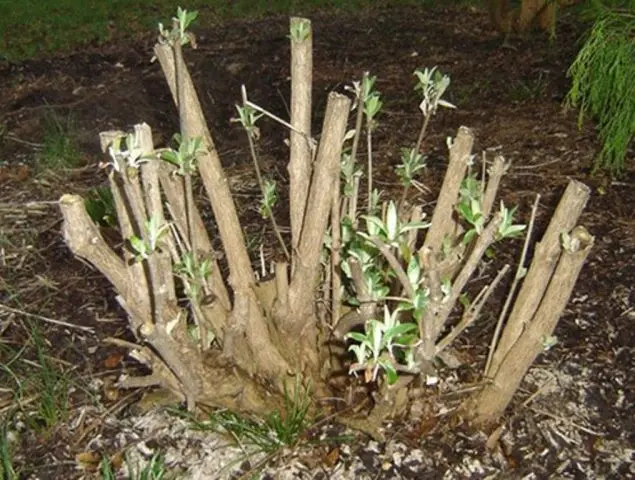Contents
Buddleya is an ornamental, flowering shrub that pleases with its beauty and delicate aroma for many years. Despite the fact that the plant is native to the tropics, there are species that can withstand lower winter temperatures. Planting and caring for a budley in Siberia is not particularly difficult, so a shrub can decorate a summer cottage with its flowering in a dull autumn time.
Planting buddley in Siberia
To grow a budley in Siberia, you need to choose the right variety that can withstand changeable climatic conditions. For Siberia, David’s budley will be the most suitable, which has many features:
- When growing budley in Siberia, young shoots may freeze out, but will quickly recover in early summer.
- The variety is fast-growing, in a few months it can form a crown with a diameter of up to 70 cm.
- From the end of July to October, the plant begins to bloom abundantly.
- The spreading crown of the budley is covered with dark green foliage and lilac fragrant flowers.
- The standard color of David’s budley is lilac-lilac, but, thanks to the work of breeders, varieties with white, pink, purple-red, pale lilac inflorescences are bred.

To grow a beautifully blooming budley in Siberia, you need to choose a suitable place, prepare the site, know the timing and planting algorithm. Planting a budley does not require additional effort and time, so even a novice Siberian summer resident can handle this activity.
When to plant
Planting budley in Siberia is carried out immediately after the soil warms up to + 10 ° C. Since even slight spring frosts can destroy a young plant. In Siberia, planting budleys is carried out at the end of May in the middle of June.
Site selection and soil preparation
Budleya is a light-loving, tropical plant that will show its beautiful flowering in Siberia only in a well-lit, draft-protected area. Since the budlea forms a powerful and sprawling shrub, it is necessary to provide it with sufficient space for full development.
Budley is an unpretentious plant that can grow in any soil. But, according to gardeners, the best growth, development and beautiful flowering of a plant occurs on light, nutritious, well-drained soil with neutral acidity.
Landing algorithm
You can grow a buddleia in Siberia with seeds or rooted cuttings. Since the plant is powerful and spreading, the distance between the planting holes should be at least 1,5-2 m. Budley planting rules:
- Dig a landing hole 50×50 cm in size. The depth should be 20 cm more than the size of the root system.
- The bottom is covered with a 15 cm layer of drainage (broken brick, gravel or small pebbles).
- A layer of garden soil mixed with compost, rotted manure or complex mineral fertilizers is laid on the drainage.
- The roots of the plant are straightened and carefully distributed on the prepared mound.
- The budley is covered with nutrient soil, tamping each layer to prevent the appearance of an air cushion.
- Further, the earth is abundantly shed and mulched.

Features of growing buddleia in Siberia
Budley, like any plant, requires proper care. Observing simple rules, the shrub will delight you with abundant flowering with an unforgettable aroma.
Budley loves frequent watering, without stagnant moisture. In dry summers, irrigation is carried out once a week, up to 10 liters of water are used for each adult plant. The shrub can be watered under the root and by sprinkling. It is better to alternate irrigation methods, since after sprinkling a budley in Siberia it will feel like in its native, humid-tropical climate. To prevent burning of leaves, spraying is carried out early in the morning or after sunset.
After watering, the soil around the plant is mulched. Peat, rotted humus, straw or dry leaves are used as mulch. Mulch will retain moisture, weed control and additional organic fertilization.
For abundant flowering, the budlea must be fed several times per season:
- at the time of the appearance of the kidneys – nitrogenous top dressing;
- in the middle of summer and at the beginning of flowering – phosphorus-potassium top dressing.
If the plant is not fed, it will not stop growing and developing, but will look sickly, weakened and with poor flowering.
Pruning is one of the components in caring for a budley in Siberia. Since without it, the shrub loses its decorative appearance, does not tolerate cold, harsh winters and often suffers from various diseases. The most beautiful flowering occurs only in budley with annual strong pruning.
Removing faded buds stimulates new buds and improves self-seeding. Budley pruning is carried out in the spring, before bud break, and in the fall – a month before the onset of cold weather. Autumn pruning is necessary to remove old, diseased shoots, which can weaken the plant before the upcoming cold weather. In the spring, frozen branches are removed from the budley and give the crown a decorative look. Annual increments are shortened by 1/3 of the length.
- In the first spring, all shoots are shortened by almost half. Thanks to this, young growth is formed, which makes the bush powerful and sprawling.
- In the second year and subsequent ones, the young shoots are shortened by 2 buds. Last year’s growths of budley are cut to the level of young growths. All thin branches, as well as some of the powerful shoots, are cut out so that they do not take much strength from the skeletal branches. Thin branches can be easily shortened with secateurs, to get rid of thick ones use a lopper.

Preparing buddley for winter in Siberia
Budleya is a heat-loving plant, therefore, when grown in Siberia, it needs to make a shelter for the winter. The signal for preparation for winter is the darkening of the foliage. Before the onset of cold weather, the budley is abundantly shed (at least 1 bucket) and fed with phosphorus-potassium fertilizers. The trunk circle is sprinkled with dry soil and sprinkled with dry foliage or straw. Sawdust is not used as mulch, as the root system may begin to rot in winter. Next, the budle is cut off, leaving 20 cm stumps. After the preparatory work, they proceed to the shelter.
How to cover a buddley for the winter in Siberia
For a successful wintering in Siberia, the budley must be properly covered. To do this, you can use one of the following methods:
- After trimming, arcs no more than 20 cm high are installed above the budlea and covered with a material that does not allow moisture to pass through. From above, the structure is covered with foliage or snow. In order for the root system of the plant not to swell during the winter period, it is necessary to ensure the flow of air under the shelter.
- The prepared budlea is covered with spruce branches, and a large wooden box is placed on top. Roofing material or slate is laid on top and fixed with bricks so that the wind cannot destroy the shelter made. Polyethylene cannot be used as a heater, since under it the roots of the budley will not receive fresh air and will begin to rot.
Shelter from a plant in Siberia is removed only after the air warms up to + 10 ° C and the threat of spring frosts has passed.
Conclusion
Due to the fact that planting and caring for a budley in Siberia is simple, it has been widely used in landscape design. The plant shows its beautiful flowering in early autumn, when most shrubs lose their decorative appearance.









